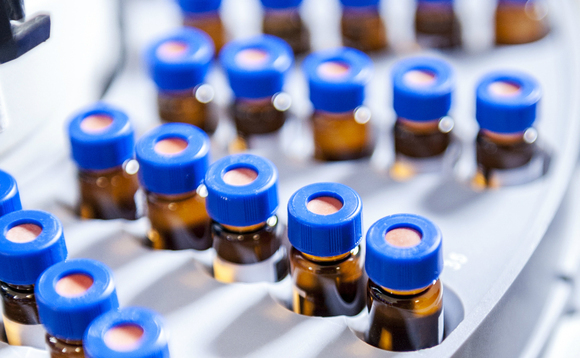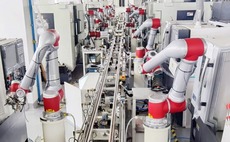
Portfolio: STIC Investments and Access Bio

STIC Investments backed Access Bio when the Korean-led malaria testing technology player wanted to buy key components and expand output. Now KOSDAQ-listed, the company has its eye on specialty diagnostics
Antibodies are the building blocks of Access Bio's malaria testing kits. The company, US-incorporated but founded by a South Korean scientist, is at the forefront of in vitro rapid diagnostic tests (RDTs), which allow speedy detection of malaria in developing countries where the disease is so prevalent yet the equipment and technicians required for microscopic analysis are lacking.
The parasite that infects blood cells, causing malaria, produces antigens and these are what the RDT is designed to search for. A blood sample is taken from the patient and mixed with a chemical buffer and the antibody in a small plastic cassette. If antigens are present, the antibody binds to them and the chemical reaction is visible in the cassette's test window.
RDTs are relatively cheap to produce and easy to transport; and the results of a test, which can be carried out in a patient's home, are known within 15 minutes.
The World Health Organization (WHO) endorses RDTs because they reduce the amount of money spent on anti-malarial drugs by ensuring suspected cases are not treated presumptively. The 31 manufacturers that have participated in the organization's testing program have seen sales jump from less than 50 million units in 2008 to 205 million in 2012, most of which were bound for Africa. Access Bio's CareStart RDT continually ranked first in the testing program during this five-year period.
However, in 2011 the company was in a quandary. It bought antibody clones used in its malaria RDTs from a US company called Flow, Inc, but the founder wanted to retire and so put the products up for sale with a $6 million price tag.
"The founder appointed Access Bio as the primary purchaser but we didn't have enough money," says Young-Ho Choi, the company's CEO. "These clones are the most important component in immunodiagnostic products. We were worried they would go to our competitors, which would mean we couldn't manufacture the malaria products any longer."
Access Bio reached out to STIC Investments for help. The private equity firm duly pumped in KRW12.5 billion ($11 million) - to cover the Flow purchase and boost manufacturing capacity - for a 28.9% stake. Access Bio saw its sales rise from $11.4 million in 2010 to $32.8 million in 2012, while operating profit more than trebled to $7.5 million over the same period.
The company went public in May 2013, STIC selling shares before and during the IPO to reduce its holding to 15%. The investment has already generated a multiple of 2.3x and the full return could be as high as 5x, with the remaining stake currently worth around KRW38 billion.
"Access Bio is the first US-based biotech company to list on KOSDAQ so the Korean exchange was very enthusiastic about the IPO. That drove a lot of interest from the market, not only from the institutional investor side but also from the retail side," says Mik Park, who leads STIC's investments in biotech and healthcare.
Indeed, the company has experienced something of a post-IPO hangover. After hitting the exchange's 15% price volatility limit on each of its first two days trading, Access Bio's stock has since slipped from its peak of KRW12,350 to just shy of KRW10,000. Choi adds that the company is coming to the end of its "adjustment period."
Biding its time
STIC's investment in Access Bio was not opportunistic. Park came across the business in 2008 through the Samsung Advanced Institute of Technology, as the first malaria RDT was becoming established. He was impressed by the technology and research capabilities, but decided to hold back; revenues were only $2-3 million, so it was too small a target.
By this point, Access Bio was already six years old. Choi, who had a decade's worth of experience working for diagnostic companies, started out developing dengue, scrub typhus and pregnancy RDTs, supported by a handful of employees. Initial funding came through a $400,000 bioscience grant from the New Jersey Economic Development Administration - Access Bio was founded in New Jersey - and $2 million from the US Department of Defense.
The switch to malaria RDTs in 2004 did not represent a huge leap because the platform is similar to dengue. Medecins Sans Frontieres (MSF) evaluated CareStart products in a field study against competing RDTs and it proved to be the stand-out performer.
The release of the MSF report in 2006 was the springboard by which Access Bio came to wider attention. Endorsements from the WHO, the Global Fund to Fight AIDS, Tuberculosis and Malaria, and the UNICEF duly followed.
These organizations do not make direct purchases of RDTs, rather they conduct test and make recommendations to purchasers. Major buyers include John Snow, Inc, a US-based public health research and consulting firm, and the Partnership For Supply Chain Management (PFSCM), a non-profit dedicated to creating secure, cost-effective and sustainable supply chains to meet the needs of healthcare and other public services.
In addition, the health authorities of countries and territories suffering from malaria are responsible for their own purchasing programs.
"We don't need to do customer marketing. It is more interacting with each country and educating them and letting them know that our products are recommended by the WHO," says Choi. "We also participate as a member of the malaria control group and are actively involved in policy making. We are scientists so we have views on product specification and technical ideas, and then there is a lot of discussion about standardization to ensure products are user-friendly and safe."
The WHO estimates that more than one billion diagnostic tests - including RDTs and other solutions - are required, with Africa alone needing 600 million. Between 2010 and 2012, the proportion of suspected malaria cases receiving diagnostic tests in the public sector rose from 44% to 64%, and from 37% to 61% in Africa specifically.
Although 31 manufacturers have participated in the WHO's testing program, Access Bio is one of three companies that between them control more than 80% of the malaria RDT market.
Expansion plans
Meeting this rising product demand was only possible through automation of Access Bio's manufacturing processes. The acquisition of the Flow assets meant the company could vertically integrate its supply chains and STIC sent in consultants to work on this and other areas.
"We helped them improve production efficiency through adopting automated processes," says Park. "We have an internal team of full-time advisors who previously worked at Samsung Electronics and have experience running manufacturing facilities."
The private equity firm also introduced Access Bio to one of its other portfolio companies, China-based Triplex International Biosciences. Triplex manufactures medical diagnostic reagents and related equipment - primarily for the detection of Hepatitis B and C and certain cancers - as well as running a chain of diagnostic centers. Its products are sold in more than 1,800 hospitals, clinics and health centers across China.
Negotiations are still in their early stages, but it is hoped that Access Bio can use the Chinese company's distribution network to expand the market for its RDT products.
Access Bio now has 50 full-time employees and 300 part-time assembly line staff at its US headquarters. It has a manufacturing facility in Ethiopia with three key personnel and 30 part-time workers, and recently established a presence in Korea, hiring a further 20 full-time employees.
The product pipeline has expanded from a variety of malaria RDTs to include mutant malaria and G6PD RDTs - and in both cases Access Bio was the first to commercialize this technology globally.
The G6PD product is especially important because it identifies cases in which the body doesn't have enough of a certain enzyme that helps red blood cells function normally. If primaquine - a medication used to treat malaria - is administered to patients with G6PD deficiency it can cause abnormal breakdown of the red blood cells, potentially resulting in death.
"Without knowing the G6PD status they can't give out drugs because if the patient is deficient it will have dire side effects," Choi explains.
CareStart G6PD RDT, which goes into commercial use this year, detects the enzyme. A G6PD reader and biosensor, intended to improve the accuracy of results analysis, are at the clinical and feasibility testing stages.
It is estimated that 5% of the global population - 57% in Asia and the Middle East and 23% in Africa - suffer from this deficiency. Access Bio has identified a target market of 46 million patients in Southeast Asia and the Middle East and 174 million in Africa, with $400 million to be made from selling RDTs.
Malaria and G6PD RDTs currently account for 80% of the company's revenues, with the remainder coming from sales of reagents, antibodies and semi-raw materials for HIV testing. Products under development include RDTs for dengue, typhus and influenza. There are also moves to expand into animal and veterinary diagnostics, starting with a swine diagnostics solution.
Getting specialized
However, Access Bio's management is most excited about molecular diagnostics, which would allow the company to further diversify its business from that of competitors in the RDT market. The global molecular diagnostics industry was worth $9 billion in 2009 and it is expected to grow to $15.5 billion in 2014 and then $42.5 billion in 2019.
In September of last year, the company acquired YeBT, a Korean venture focused on researching biomarkers and developing diagnostic techniques for DNA and protein chips. In addition to absorbing YeBT's R&D team, Access Bio took ownership of a technology called TotalPlex that amplifies pieces of DNA, facilitating, among other things, the detection and diagnosis of diseases.
"The human genome has been sequenced and now technology is so advanced and so affordable," says Dr. Young S. Hong, Access Bio's director of business development. "The technology used to detect those sequences - the polymerase chain reaction - is so sensitive it's like detecting a needle in a haystack.
"We have patented technology that finds targets in a very sophisticated way. If the DNA sequence is available we can develop a good product in a short space of time with excellent specificity."
YeBT has developed molecular diagnostic tests for diseases such as HPV, CAH and leukemia that are ready to be commercialized. The HPV product is expected to be commercialized as early as the second half of 2014 and Hong claims its performance is equal to or superior than the current market leaders. The plan is to price it attractively and target developing markets such as Latin America, Southeast Asia and Central Asia.
Other molecular diagnostics offerings will focus on screening tests for organ transplantation. By comparing the genetic backgrounds of donors and receivers, it is hoped that the odds of a successful match can be substantially reduced.
The future for Access Bio therefore lies in specialty diagnostics and the IPO was timed in part to provide capital that can be invested in these areas. Park believes this approach could see the company's revenues continue to accelerate: having grown roughly 10-fold in the last five years, he estimates they could reach $200 million within the next five years.
"Companion and individualized diagnostics will be the next market-leading products in healthcare," adds Choi. "Individualized healthcare will be more effective for patient care, and as such become more popular and affordable as biotechnology continues to advance."
Latest News
Asian GPs slow implementation of ESG policies - survey
Asia-based private equity firms are assigning more dedicated resources to environment, social, and governance (ESG) programmes, but policy changes have slowed in the past 12 months, in part due to concerns raised internally and by LPs, according to a...
Singapore fintech start-up LXA gets $10m seed round
New Enterprise Associates (NEA) has led a USD 10m seed round for Singapore’s LXA, a financial technology start-up launched by a former Asia senior executive at The Blackstone Group.
India's InCred announces $60m round, claims unicorn status
Indian non-bank lender InCred Financial Services said it has received INR 5bn (USD 60m) at a valuation of at least USD 1bn from unnamed investors including “a global private equity fund.”
Insight leads $50m round for Australia's Roller
Insight Partners has led a USD 50m round for Australia’s Roller, a venue management software provider specializing in family fun parks.







